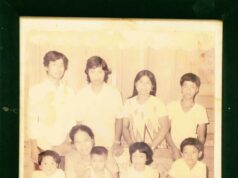His passing like his coming was uneventful. Born before World War II, Lolo Sequel died when the nation elected its 42,025 barangay leaders. Lolo Sequel was the bachelor younger brother to my mother, dear, dear uncle to me and to most of my family members, he was simply the beloved Lolo Sequel. Like many of us, he lived a life of poverty and obscurity. If there was noise all over, it was not intentionally intended to herald his presence or absence. For the most part of his life, Lolo Sequel was content with being a back ground. Even at the height of EDSA 1, he would recount how he hit the jackpot selling “dirty” ice cream.
Indeed, Lolo Sequel’s life was a life lived like many of us. Lolo Sequel was a migrant, a traveling pilgrim who was forced to go to Manila in search of the proverbial gold pot in the city, and never found one. Back in the 50s and 60s, his family, like many families from his poverty-stricken town of Barugo, Leyte, had to take shelter in one of the many extended and confounded relatives in the then sprawling squatter’s area in Sta. Ana, Manila.
Bereft of any formal education due to poverty, he could barely read or write. As it was in the 50s and 60s as it is today, the city has its way of educating its young. Lola Sequel had to find a living along the stretched and breathed of the Philippine National Railway that cuts along the Pandacan, Manila area. He became a street fighter, or to be exacting, a railway fighter, who would exchange brawls with anyone for a bet. At a tender age of 15, he would not only go home with blood all over his shirts, but also with his well-earned money for the upkeep of his elder sister’s family.
Eventually, with the pleadings of his sisters, he stopped his days of street fighting. Like many youth of his days out to survive the merciless city streets, he learned to smoke and to drink and to gamble. I do remember the days when my mother would be out in the morning searching for his younger brother, and would find Lolo Sequel sleeping in the streets from a night of drunkenness. The Sta. Ana Racing Club, we used to joke among ourselves, was Lolo Sequel’s second if not first home.
He became a construction worker. With very little social security protection, his pride as a construction worker was reduced to his literal finger pointing to some famous city landmarks that he was supposedly part of in construction. In retrospect, I half-believe and half-disbelieve that his finger-pointing was a way of saying: the constructed buildings were his own landmarks of success or were part of his personal failures. After years as a construction worker, his body became frail. Lolo Sequel was forced to find other jobs.
He became a balut vendor, a taho vendor, and eventually settling to be a “dirty” ice cream vendor. His days as a “dirty” ice cream vendor were like a daily treat for a growing boy like me. He would always come home with spare of various ice cream flavors for us kids. Lolo Sequel never left the side of my mother. It is as if she was my mother’s alter ego. There were many instances where he could have chosen to live in other relatives’ house but he would not. His choice was always my mother’s. I believe the War days must have cemented the bond between my mother and his younger brother. To this day, my old mother, like many old people, never fails to repeatedly recite the days where he would carry her younger brother to her bare back to escape death from the hands of the Japanese. The metaphor or the story did not escape me. Like most of us, aren’t we all ready to carry the burdens and die if need be for the people we love?
Ironically, even in his old age, Lolo Sequel refused to be a burden to anyone. He scoured the streets of Makati, on days he was not caught, to peddle white rags sewn by my third elder sister. His refusal to be a burden was like a mantra he lived even in his dying hours. In the days where most of us were struggling to get an education, Lolo Sequel came very generous, especially for our pocket money. Even when drunk or especially when he was drunk, he would give us baon for school. In his old age, he was all too-quick to lend his pension to any family member that needs help.
Ate Nenit, my sister living Down Under, broke the news on the death of Lolo Sequel to me. In between the sobs and gasps for air over the phone, she said that Lolo Sequel passed away. Even if I was already prepared, in fact, that morning before she broke the news, Ate Net and I were talking about the possibility of Lolo Sequel’s death: I was and still am in a state of shock. I spent the rest of the evening reminiscing about this Uncle, this Lolo, who was very much part of my happy childhood days.
There is this 80s song by Coritha that goes: “Si Lolo Sequel, si Lolo Sequel, si Lolo Sequel ay matanda na. Ngunit mahal ko pa si Lola Sequel kahit siya ay laos na”. The moment I heard that song, I knew in my heart, it was written for my Uncle. The song captured everything we want to say about him.
There can be many possible reasons, descriptions and explanations for our death. However, there are no reasons not to touch, not to effect, not to change, not to make better the lives of others, in whatever degree or form it may be, in whatever status in life we may find ourselves.
Let me correct myself. I think only the utterly selfish dies poor and obscure.
Indeed, Lolo Sequel’s life was a life lived like many of us. Lolo Sequel was a migrant, a traveling pilgrim who was forced to go to Manila in search of the proverbial gold pot in the city, and never found one. Back in the 50s and 60s, his family, like many families from his poverty-stricken town of Barugo, Leyte, had to take shelter in one of the many extended and confounded relatives in the then sprawling squatter’s area in Sta. Ana, Manila.
Bereft of any formal education due to poverty, he could barely read or write. As it was in the 50s and 60s as it is today, the city has its way of educating its young. Lola Sequel had to find a living along the stretched and breathed of the Philippine National Railway that cuts along the Pandacan, Manila area. He became a street fighter, or to be exacting, a railway fighter, who would exchange brawls with anyone for a bet. At a tender age of 15, he would not only go home with blood all over his shirts, but also with his well-earned money for the upkeep of his elder sister’s family.
Eventually, with the pleadings of his sisters, he stopped his days of street fighting. Like many youth of his days out to survive the merciless city streets, he learned to smoke and to drink and to gamble. I do remember the days when my mother would be out in the morning searching for his younger brother, and would find Lolo Sequel sleeping in the streets from a night of drunkenness. The Sta. Ana Racing Club, we used to joke among ourselves, was Lolo Sequel’s second if not first home.
He became a construction worker. With very little social security protection, his pride as a construction worker was reduced to his literal finger pointing to some famous city landmarks that he was supposedly part of in construction. In retrospect, I half-believe and half-disbelieve that his finger-pointing was a way of saying: the constructed buildings were his own landmarks of success or were part of his personal failures. After years as a construction worker, his body became frail. Lolo Sequel was forced to find other jobs.
He became a balut vendor, a taho vendor, and eventually settling to be a “dirty” ice cream vendor. His days as a “dirty” ice cream vendor were like a daily treat for a growing boy like me. He would always come home with spare of various ice cream flavors for us kids. Lolo Sequel never left the side of my mother. It is as if she was my mother’s alter ego. There were many instances where he could have chosen to live in other relatives’ house but he would not. His choice was always my mother’s. I believe the War days must have cemented the bond between my mother and his younger brother. To this day, my old mother, like many old people, never fails to repeatedly recite the days where he would carry her younger brother to her bare back to escape death from the hands of the Japanese. The metaphor or the story did not escape me. Like most of us, aren’t we all ready to carry the burdens and die if need be for the people we love?
Ironically, even in his old age, Lolo Sequel refused to be a burden to anyone. He scoured the streets of Makati, on days he was not caught, to peddle white rags sewn by my third elder sister. His refusal to be a burden was like a mantra he lived even in his dying hours. In the days where most of us were struggling to get an education, Lolo Sequel came very generous, especially for our pocket money. Even when drunk or especially when he was drunk, he would give us baon for school. In his old age, he was all too-quick to lend his pension to any family member that needs help.
Ate Nenit, my sister living Down Under, broke the news on the death of Lolo Sequel to me. In between the sobs and gasps for air over the phone, she said that Lolo Sequel passed away. Even if I was already prepared, in fact, that morning before she broke the news, Ate Net and I were talking about the possibility of Lolo Sequel’s death: I was and still am in a state of shock. I spent the rest of the evening reminiscing about this Uncle, this Lolo, who was very much part of my happy childhood days.
There is this 80s song by Coritha that goes: “Si Lolo Sequel, si Lolo Sequel, si Lolo Sequel ay matanda na. Ngunit mahal ko pa si Lola Sequel kahit siya ay laos na”. The moment I heard that song, I knew in my heart, it was written for my Uncle. The song captured everything we want to say about him.
There can be many possible reasons, descriptions and explanations for our death. However, there are no reasons not to touch, not to effect, not to change, not to make better the lives of others, in whatever degree or form it may be, in whatever status in life we may find ourselves.
Let me correct myself. I think only the utterly selfish dies poor and obscure.




